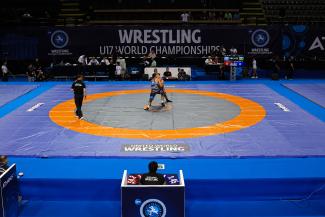ATHENS, Greece (July 29) -- The second day of the World U17 Championships in Athens will see five more Greco-Roman weight classes -- 45kg, 51kg, 60kg, 71kg and 92kg.
WATCH LIVE | LIVE MATCH ORDER | DAY 1 RESULTS
READ THE SEMIFINALS REPORT HERE
The semifinals will begin at 17:00 hours local time and the medal bouts from Monday's weight classes will start at 18:00 hours.
15:50: Asian bronze medalist Otabek TURSUNOV (UZB) takes out European champion Marat ATSHEMYAN (ARM) 5-2 in the 51kg quarterfinal.
15:45: Ionut PATRU (ROU) stuns Mamuka BIDZINASHVILI (GEO) in the 92kg quarterfinals and reaches the semifinal. Earlier in the day, he had said that he will become the world champion tomorrow.
15:30: In a match that took forever, Asian U17 champion Damir AKAN (KAZ) has been cautioned out after his second defensive four against Abolfazl ZARE (IRI) at 60kg. Akan led 7-0 as he scored from par terre and Zare fouled. But in the second period, Zare scored a turn and one foul from Akan made it 7-5. As the bout resumed in par terre, Akan made a second defensive leg foul which handed Zare the win.
15:15: Asian U17 champion Behruzbek VALIEV (UZB) defends from par terre and holds on to his 1-1 criteria lead against Hossein KAZEMI (IRI) to enter the semifinal at 71kg. Kazemi challenged for a stepout from par terre but lost it and Valiev won 2-1.
15:05: Benyamin KHEZLI (IRI) with gut-wrench from par terre and he beats Juntao LUO (CHN) 9-0 at 45kg to enter the semifinals at 45kg.
15:00: In a rematch of the European final, Abdurrahman HUSEYNLI (AZE) comes back from 6-0 deficit and beats Saba ABASHIDZE (GEO) 9-6. Abashidze hit a big four and then a turn to lead 6-0. But Huseynli scored a takedown and two arm-trap guts to make it 6-6. Another gut-wrench made it 8-6. Huseynli got par terre in second period but did score. Abashidze could not turn around the 9-6 score and lost the quarterfinal.
14:42: Down goes European U17 champion Giorgi GOGELASHVILI (GEO) at 71kg. Yusif AHMADLI (AZE) beats the Georgian 7-2. He got going in the second period with a takedown and four-pointer.
14:35: Pavlos TSENTIDIS (GRE) with a banger of a throw to finish all hopes of Daniyar BAZARBEK (KAZ) in their 51kg match. Tsentidis was leading 5-0 when Bazarbek jumped for a big move. Tsentidis grabbed and locked him and slammed him on the mat for four! Great throw
14:25: Asian champion and returning bronze medalist Behruzbek VALIEV (UZB) with a beautiful suplex for five and then pins Radoslav PERYANSKI (BUL) at 71kg. He looks good to upgrade his bronze to gold this year.
14:15: Marat ATSHEMYAN (ARM), European champ at 51kg, reaches the quarterfinals with a 8-0 quick win over Yuvraj KAMANNA (IND).
European bronze medalist Abu Bakar SAGA (NOR) takes a minute and 26 seconds to win 10-2 over Kaloyan BORISOV (BUL)
13:45: Amirsam MOHAMMADI (IRI) wins a tough battle against Said PASHAYEV (AZE) at 92kg, 6-1. Just better defense from Mohammadi as he beats Pashayev, who is actually a European champion in Freestyle.
13:30: Asian champion Damir AKAN (KAZ) rolls to a 10-0 win over RITESH (IND) at 60kg and Mika LABES (GER) blanks Imre JUHASZ (HUN) 6-0 in the next bout.
13:15: Benyamin KHEZLI (IRI) pulls off a great win over European bronze medalist Ararat AVETISYAN (ARM) 8-1 at 45kg. Another big win for Iran.
13:00: Asian champion Behruzbek VALIEV (UZB) takes 2 minutes and 48 seconds to win his 71kg bout against Matias ONNENLEHTO (FIN)
12:45: Giorgi GOGELASHVILI (GEO), European champion at 71kg, just keeps his calm and despite losing a challenge in the bout, he roars in the second period to beat Balaz UJHELJI (SRB) 7-1
12:15: Abu Bakar SAGA (NOR) hangs on for a 6-3 win over Herman BASARAB (UKR) at 51kg. Saga won bronze medal at the European Championships in Skopje
12:00: Pavlos TSENTIDIS (GRE) sends the local crowd in a frenzy with a final-second throw against Carter SHIN (USA) and wins hi 51kg bout 3-2. USA challenge but lose it on review.
11:45: Amirsam MOHAMMADI (IRI) looks so good at 92kg! He rolls Vladislav VASYLEVSKYI (MDA) and wins his bout 8-0.
11:35: Denys SEREDIN (UKR) with a massive throw on the edge to get five points and Vasileios TSAROUCHAS (GRE) is called for leg foul as well which give two more points to Seredin. The Ukraine finishes the 60kg bout 10-3
11:25: Amangeldi YSAKBAEV (KGZ) rallies to win 11-7 against Zaven MEZHLUMYAN (ARM) after being down 7-1 at 60kg. Ysakbaev throws Mezhlumyan for a four and adds a two to lead 7-7 on criteria and when the Armenian tries a flying squirrel, Ysakbaev throws him down for four more
11:15: Asian U17 champion Damir AKAN (KAZ) was never in danger against Kodai HIHARA (JPN). Akan manages an 8-1 lead before winning his 60kg bout 8-2
11:00: Abolfazl ZARE (IRI) begins day two for Iran with a big 9-0 win over Wail BEN AISSA (ALG) at 60kg. Zare got the par terre and two exposure for the lead. He then gets the par terre in the second period as well and wins with another turn.
10:30: The repechage matches will kick off day two in Athens before we move into the qualification rounds of 45kg, 51kg, 60kg, 71kg and 92kg.



Share your thoughts.
Comments